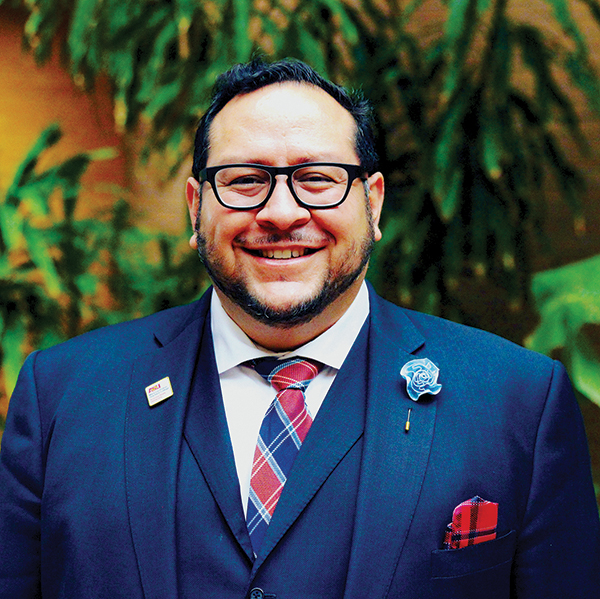
Rodríguez
From Boy Scouts to a national commission, service to his community has been a driving force for Cristóbal Rodríguez ’01 ’03. Raised in El Paso, Texas, his focus on helping people was nurtured at NMSU as a student and then staff and faculty member.
In September 2022, he was appointed to the President’s Advisory Commission on Advancing Educational Equity, Excellence, and Economic Opportunity for Hispanics at the White House. As a member, Rodríguez, educational leadership and policy studies associate professor at Arizona State University, hopes to not only inform federal officials on pressing needs for equity in education but to also work on creating a roadmap to improve opportunities across the educational pipeline.
“It’s a humbling opportunity to be called to serve knowing that there’s much more to be done in the educational system,” Rodríguez says.
“Nationally, Latino students are at half the rate compared to all groups of going from undergrad to graduate studies enrollment,” he says. “That’s a huge issue when it comes to the need for representation across the various professions that require a graduate degree—medical profession, legal profession, educational leadership.
“That’s a huge disparity that needs to be addressed,” Rodríguez says. “As a researcher, as a scholar, it’s important for me to voice that hope.”
Rodríguez realized the importance of educational policy while directing a federal grant, Health Careers Opportunity Program, as a staff member at NMSU. The program focused on college readiness for high school students interested in health care careers who would return to their communities, some of the most underserved areas in the country
“They wanted to leave the rez, they wanted to leave the barrio, they wanted to leave the hood, and not look back,” Rodríguez says. “Our work was not just about college readiness, it was also about transforming their narrative to one where they saw themselves as solutions to their community, by acknowledging that they already had cultural and linguistic assets within them.”
Despite students’ significant academic gains, the federal government defunded the program. That experience inspired Rodríguez to pursue a Ph.D. at the University of Texas at Austin.
“For me, it was a moment for how policy and politics contributed negatively to the opportunities that our communities were receiving,” he says.
“New Mexico State as a Hispanic-serving institution was critical in providing the access as a public university and then placing me in the pathway that then led me to aspire toward my Ph.D. and graduate studies to not only become a scholar but also a national advocate.”

Dove Hall, Room 212
305 N. Horseshoe Drive
Las Cruces, NM 88003